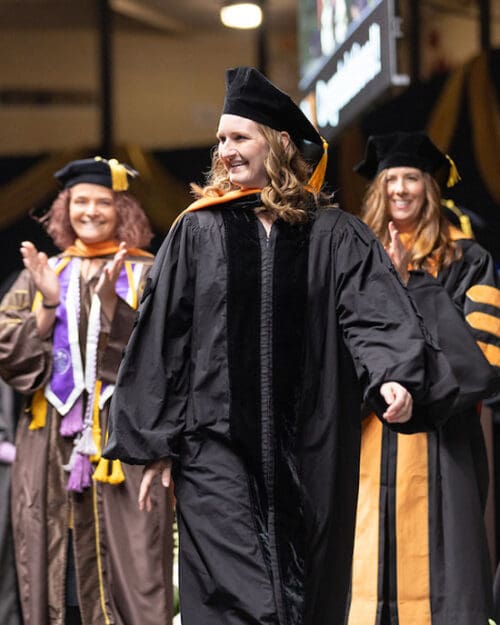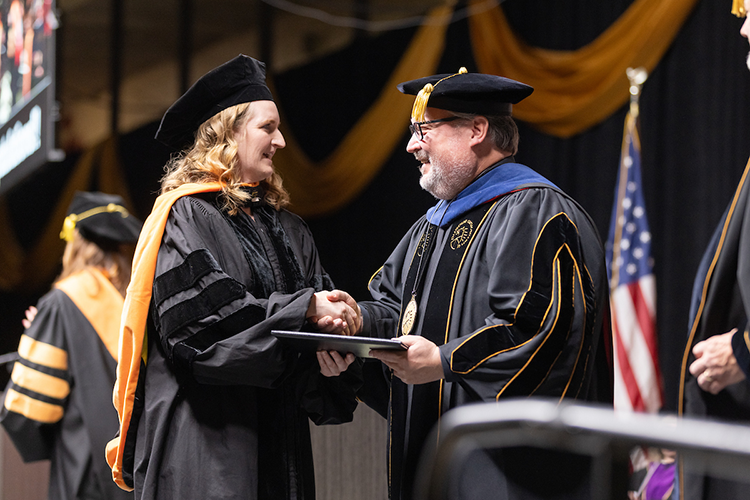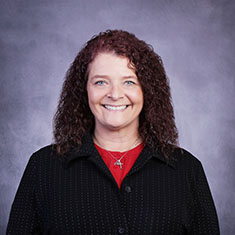PNW’s DNP students translate science into practice

Kristina James
Kristina James’ (DNP’24) decision to pursue a Doctor of Nursing Practice (DNP) degree from the College of Nursing at Purdue University Northwest (PNW) stemmed from a desire to expand her knowledge and make a greater impact in the nursing field. With her DNP, she hopes to lead her team to more effective practices, positively impact patient outcomes and drive meaningful change in health care.
“As a nursing professional, I think it’s important to make sure the entire interdisciplinary team is firing on all cylinders,” says James. “Our physician partners and other providers have terminal degrees, and it’s important that nurses take those next steps as well. That advanced knowledge leads to the best care for everyone.”
After earning her MSN from a university in California and building her career in the same state, James became accustomed to what she describes as the “California style” of nursing. When researching DNP programs, she was looking for one that offered broader nursing perspectives and insights from across the country.
“I chose PNW for my DNP because I felt it would give me the opportunity to learn alongside nurses with varied backgrounds and experiences,” says James.” I really appreciated that unique opportunity.”
The faculty understood that many of us were working professionals. They supported us in how we approached our courses and assignments, which made a huge difference.
The DNP program at PNW focuses on translation science, the ability to take evidence and research findings and apply them in clinical practice. The program prepares students to become experts in the search, appraisal, synthesis, transfer and application of evidence, as well as the evaluation of its impact on outcomes.
“What I really loved about the program was the flexibility and the many opportunities to develop and hone my skills in translation science,” says James. “The faculty understood that many of us were working professionals. They supported us in how we approached our courses and assignments, which made a huge difference. Also, the courses broke down each part of the translation science process and by the final year, I had built a solid foundation to implement my practice inquiry project with confidence.”
Engaging in evidence-based training
As an assistant nurse manager at the University of California at San Diego Health, James used her practice inquiry project to develop an evidence-based training program for nurse leaders at UC San Diego Health. Inspired by the hardships nurses faced during the pandemic and the Centers for Disease Control and Prevention (CDC) data on nurse suicides related to job stress, she saw a clear need for better support tools.
As a nurse leader, she wanted to create a resource to help leaders communicate more effectively with team members. Her project, titled “Implementation of a Suicide Prevention Training for Nurse Leaders,” provides instruction for recognizing team members in crisis or at risk of suicide and outlines available resources for both the leaders themselves and the team members at risk. The program also includes role-play exercises, providing a safe space to become comfortable with those discussions.
Her project has been incorporated into the onboarding program for new nurse leaders at UC San Diego Health.
James also co-authored an article on the same topic titled “Supporting nurse leaders to recognize and intervene in team members’ suicidality” that will be published in the Journal of Nursing Scholarship.

Kristina James receives her Doctor of Nursing Practice degree with a congratulatory handshake from Chancellor Kenneth C. Holford.
Making a transformative impact for health care
PNW’s DNP program provides a rigorous path of study for advanced nursing professionals to enhance their health care knowledge and leadership, as well as elevate their career opportunities. As an applied doctoral program, outcomes involve synthesizing evidence-based practices that can transform and advance the quality of health care delivery in different settings.
PNW DNP candidates learn in a hybrid format and often implement their applied research and practice inquiry project in their own workplace or nearby clinical settings. Candidates’ research helps build on professional work experience they have acquired by providing hands-on learning opportunities with the rigor and sensitivity required for working with human research participants, including those within vulnerable populations.
Our students enter with clinical expertise and graduate with the research skills, critical thinking abilities, and evidence-based approach needed to solve the complex healthcare challenges facing our communities.
Graduates of the program earn a heightened qualification to rise to impactful leadership roles not only in traditional clinical settings, but also through advising and expertise on health care policy and as educators of future nurses.
“What excites me most about our DNP program is witnessing the transformation of passionate nurses into innovative healthcare leaders who don’t just adapt to change—they create it,” said Julia Rogers, coordinator of PNW’s DNP program and associate professor of Nursing. “Our students enter with clinical expertise and graduate with the research skills, critical thinking abilities, and evidence-based approach needed to solve the complex healthcare challenges facing our communities. They become the bridge between groundbreaking research and real-world patient care, ensuring that science gets translated into improved outcomes for the people who need it most.”
To learn more about PNW’s DNP program, visit pnw.edu/dnp. You can also learn more about the College of Nursing by visiting pnw.edu/nursing.
